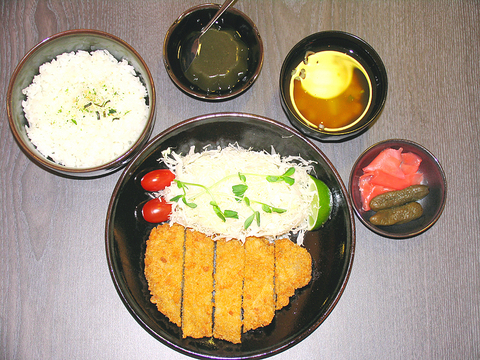There was a time when mom-and-pop stores were on the corner of every Taipei street. Now there are big-name convenience stores instead. How long until many of the family-run food stalls that dot the capital are replaced by chains?
The latest in an ever increasing line of chain store eateries catering to the masses opened last week on Nanjing East Road, a prime spot to catch office worker trade.
Serving up fried Japanese pork chops and rice, the food is not intended to win awards. The aim, rather, is to satisfy a market demographic and put the competition out of business.

PHOTO: JULES QUARTLY, TAIPEI TIMES
As Andrew Chang (張榮基), the president of Mercuries and Associates Ltd's food division, put it when opening the store recently: "The meal is not as oily as in Japan and, of course, we have had to alter it to suit local tastes. This is the first of a chain and we will test whether the concept succeeds."
He then explained how Tonkatsu would prevail. First, it would spend twice as much as its rivals on oil (a good idea). Second, the quality of the pork would meet national standards for frozen meat (you would hope so). Finally, the rice is said to be the variety that was grown exclusively for Japan's emperor around 70 years ago.
To be fair, the result is not bad. Our meal arrived with miso soup and a few condiments, plus a small tea dessert. The main dish of fried pork had a clean flavor and arrived with a garnish of two cherry tomatoes and a lemon. For NT$130 and free refills of rice, cabbage and miso soup there can be few complaints.
Other choices included fish fritters, fried giant shrimps, beef and chicken curry. The curry sauce to go with the signature dish, fried pork, is NT$40 and a cup of coke is NT$15. Put an accountant in the kitchen and this is the kind of menu you would expect: rather insipid, with portions calculated to fill the gap.
As for the decor, it's cold, white and clean with recessed fans, spotlights and bleached formica floors. The tables are dark, veneered wood. Paper lanterns are intended to give the place a kind of Japanese feel. A couple of illuminated signs advertising the food and some fire extinguishers complete the picture.
There is a tradition in Japan that if you have a pork chop meal you will have good luck, hence the name of the restaurant in Chinese "Happy Victory Pavilion"
Address: 170 Nanjing E. Rd Sec2, Taipei
Telephone: (02) 2516 2606
Open: 11am to 10pm
Average meal: NT$130
Details: Chinese and Japanese menu

May 11 to May 18 The original Taichung Railway Station was long thought to have been completely razed. Opening on May 15, 1905, the one-story wooden structure soon outgrew its purpose and was replaced in 1917 by a grandiose, Western-style station. During construction on the third-generation station in 2017, workers discovered the service pit for the original station’s locomotive depot. A year later, a small wooden building on site was determined by historians to be the first stationmaster’s office, built around 1908. With these findings, the Taichung Railway Station Cultural Park now boasts that it has

Wooden houses wedged between concrete, crumbling brick facades with roofs gaping to the sky, and tiled art deco buildings down narrow alleyways: Taichung Central District’s (中區) aging architecture reveals both the allure and reality of the old downtown. From Indigenous settlement to capital under Qing Dynasty rule through to Japanese colonization, Taichung’s Central District holds a long and layered history. The bygone beauty of its streets once earned it the nickname “Little Kyoto.” Since the late eighties, however, the shifting of economic and government centers westward signaled a gradual decline in the area’s evolving fortunes. With the regeneration of the once

In February of this year the Taipei Times reported on the visit of Lienchiang County Commissioner Wang Chung-ming (王忠銘) of the Chinese Nationalist Party (KMT) and a delegation to a lantern festival in Fuzhou’s Mawei District in Fujian Province. “Today, Mawei and Matsu jointly marked the lantern festival,” Wang was quoted as saying, adding that both sides “being of one people,” is a cause for joy. Wang was passing around a common claim of officials of the People’s Republic of China (PRC) and the PRC’s allies and supporters in Taiwan — KMT and the Taiwan People’s Party — and elsewhere: Taiwan and

Even by the standards of Ukraine’s International Legion, which comprises volunteers from over 55 countries, Han has an unusual backstory. Born in Taichung, he grew up in Costa Rica — then one of Taiwan’s diplomatic allies — where a relative worked for the embassy. After attending an American international high school in San Jose, Costa Rica’s capital, Han — who prefers to use only his given name for OPSEC (operations security) reasons — moved to the US in his teens. He attended Penn State University before returning to Taiwan to work in the semiconductor industry in Kaohsiung, where he